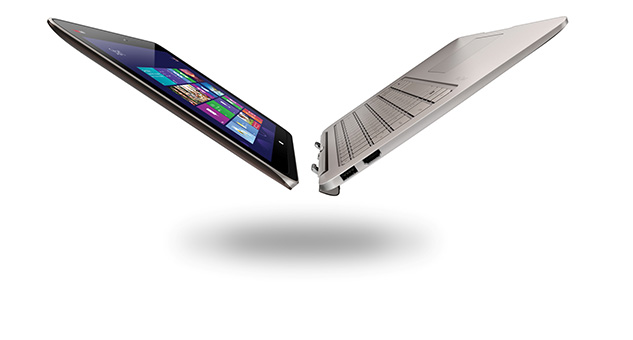HP Announces Spectre 13 x2 Hybrid Ultrabook
by Jarred Walton on September 19, 2013 7:14 PM EST- Posted in
- Laptops
- HP
- Mobile
- Tablets
- Spectre
- Convertible
- hybrids
- Ultrabook
- detachable

Since the launch of Windows 8, many users have been waiting for something that does a better job of spanning the gap between laptops/Ultrabooks and tablets. We’ve seen sliders, twist screens, laptops with touchscreens, foldable laptops like the Yoga, and even a few with detachable screens. HP now enters the market with one of the latter, as the Spectre 13 x2 that has a detachable screen.
Given that we’re talking about Ultrabook internals – and a 13” display – pricing is going to be substantially higher than what you’ll pay for a traditional tablet. HP also goes full Windows 8 here, so there’s no secondary SoC running Android like in the ASUS Transformer Book Trio. HP hasn’t yet provided us with a full rundown of the specifications, but it appears the Spectre 13 x2 will sport a 1080p display and the tablet portion pretty much only includes a microSD slot. The dockable keyboard meanwhile adds a couple USB 3.0 ports, HDMI port, and a full size SD card slot; it also includes additional battery capacity and has a backlit keyboard.
While the idea of a 13.3” laptop/hybrid is good, I do have to question the utility of a 13.3” tablet. I’ve used Dell’s XPS 12, and frankly it just feels massive when in tablet mode, and that’s a slightly smaller display size. On the other hand, typing on a 13.3” sized chassis and keyboard definitely sounds more welcoming than a 10” or 11.6” keyboard, so the detachable tablet aspect is basically a nice extra for those times when you want to leave the keyboard behind.
HP has managed to cram all of the hardware into a fanless chassis, which means they’re likely using the Core i3-4020Y (6W 1.5GHz) and Core i5-4210Y (6W 1.5-1.9GHz); it’s possible HP also supports the Core i7-4610Y (11.5W 1.7-2.9GHz), but that seems unlikely with a fanless design. (I’ll update if I hear anything more on the subject.) Pricing on the Spectre 13 x2 starts at $1099, hopefully with at least a 128GB SSD and 4GB RAM (preferably more, but that’s probably just wishful thinking). Availability is scheduled for October 2013.
Source: HP PR/News










48 Comments
View All Comments
miahshodan - Friday, September 20, 2013 - link
forgot to mention the onscreen keyboard on the 10 tablets to be limiting when writing an email or even filling out an online form.damianrobertjones - Monday, September 23, 2013 - link
All you have to do is say, "I can use this for more than work" and suddenly it's no longer just a work device.JarredWalton - Thursday, September 19, 2013 - link
Yeah, but it won't be fanless.ImSpartacus - Friday, September 20, 2013 - link
Why is it good to be fanless?A fanless design has fewer moving parts to fail. I've never heard of a laptop fan failing. Does that happen often?
It's also quieter. I think this is the big draw. However, most of the laptops that I've used are basically silent while I do basic office work. I kinda LIKE hearing my laptop while I game because I subconsciously feel like that fan sound means that I'm getting more performance than I could get without the presence of the fan. I'm crazy, I know.
Impulses - Sunday, September 22, 2013 - link
They do fail, just like desktop fans (anything mechanical is inherently more failure prone). Unlike a desktop fan tho, they can be much harder and costly to replace.FwFred - Friday, September 20, 2013 - link
Wow, fanless! Can't wait to see it tested.damianrobertjones - Monday, September 23, 2013 - link
"I don't really see a reason for these hybrids."I do. Thanks
ds2013 - Friday, September 27, 2013 - link
I agree. A convertible is a compromise and is neither a good tablet nor a good notebook. The market has spoken and the tablets range from 7" to 10.1" with the most popular tablets being 7" to 7.9". There isn't a market for a large, heavy tablet. A 13" ultrabook is a popular form factor, but as a convertibles, it is an unbalanced due to the battery location. Convertibles have been around since the original Microsoft tablet pc (2001?) and have never sold well. I don't see this changing anything.centurion87 - Thursday, September 19, 2013 - link
It would be nice to compare the Y-series Intel chips with Apple A7 and see the perf and power gap. If there is anything related to a converged device that Apple may make, the contention would be cortex-A57 class Apple CPU vs Intel Y-series CPU.ImSpartacus - Thursday, September 19, 2013 - link
I think that's still a few years out.The low-end Intel Y CPUs have like two or three times the TDP of phone SoCs.